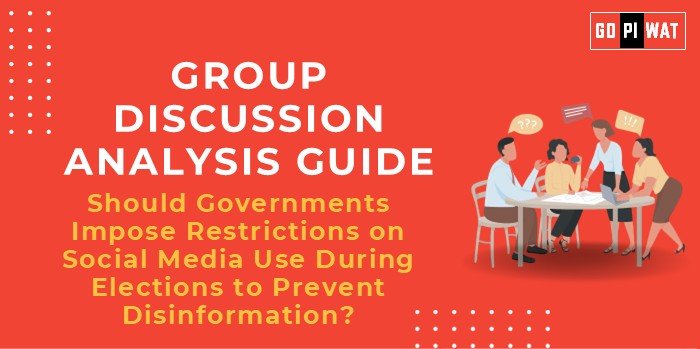📋 Group Discussion Analysis Guide
Topic: Should Governments Impose Restrictions on Social Media Use During Elections to Prevent Disinformation?
🌟 Introduction to the Topic
Social media has revolutionized modern communication, influencing politics, governance, and elections globally. However, its potential for spreading disinformation poses critical risks during elections, undermining democratic integrity.
The debate on restricting social media during elections stems from concerns about its misuse to spread fake news, manipulate voter perceptions, and incite violence. For instance, the 2016 U.S. Presidential Election and India’s 2019 General Election highlighted the scale of disinformation on platforms like Facebook and WhatsApp.
📊 Quick Facts and Key Statistics
- 🌍 Global Social Media Users: Over 4.9 billion (Statista, 2023)—a key tool for political campaigns.
- 📉 Fake News Influence: 62% of adults in the U.S. encounter disinformation on social media during elections (Pew Research, 2022).
- 🇮🇳 Indian Context: 87% of WhatsApp users received political misinformation before the 2019 elections (BBC study).
- ⚖️ Regulation Precedents: Nigeria banned Twitter temporarily in 2021 to curb unrest during protests.
👥 Stakeholders and Their Roles
- 📜 Governments: Enforce regulations, monitor content, and safeguard election integrity.
- 🏢 Social Media Platforms: Develop algorithms, identify and remove harmful content, and comply with local laws.
- 📣 Civil Society and Media Watchdogs: Advocate for transparency and fact-check disinformation.
- 👥 Citizens and Voters: Act as vigilant consumers of information, combating misinformation by verifying content.
✅ Achievements and Challenges
🏆 Achievements:
- 🤖 Improved election monitoring via AI tools on platforms like Facebook.
- 🔍 Fact-checking initiatives, such as AltNews in India, reduce misinformation impact.
- ⚠️ Content moderation practices like Twitter’s labeling of false claims during the 2020 U.S. elections.
⚠️ Challenges:
- ⚖️ Balancing freedom of speech with regulation.
- 🔒 Identifying and removing covert or algorithm-driven misinformation in real-time.
- 🗣️ Ineffective enforcement in diverse linguistic and regional contexts.
🌍 Global Comparisons
- 🇩🇪 Germany: NetzDG law enforces accountability, but it faces criticism for over-censorship.
- 🇳🇬 Nigeria: Imposed social media restrictions to prevent unrest during elections.
📌 Structured Arguments for Discussion
- 🔹 Supporting Stance: “Restricting social media during elections is essential to safeguard democracy and prevent electoral manipulation.”
- 🔹 Opposing Stance: “Government-imposed restrictions could stifle free speech and lead to authoritarian misuse of power.”
- 🔹 Balanced Perspective: “While regulation is necessary, a collaborative approach with social media platforms can ensure fairness and transparency.”
🔍 Effective Discussion Approaches
- 📈 Opening Approaches:
- Highlight statistical impacts of social media misuse during elections.
- Use case studies, e.g., 2016 U.S. Elections, to illustrate disinformation’s consequences.
- 🔄 Counter-Argument Handling:
- Cite examples of successful balanced regulations like Germany’s laws.
- Present data-driven evidence for limited or context-specific restrictions.
📈 Strategic Analysis of Strengths and Weaknesses
- ✅ Strengths: Enhanced electoral integrity, reduced voter manipulation, improved accountability.
- ⚠️ Weaknesses: Possible suppression of freedom of speech, limited effectiveness in decentralized networks.
- 🌟 Opportunities: Build cross-border regulation frameworks, leverage AI for faster moderation.
- ⚡ Threats: Misinformation spreads to less regulated channels, potential misuse of laws.
🎓 Connecting with B-School Applications
- 💡 Real-World Applications:
- Business ethics, data privacy, public policy, and technology regulation.
- 💬 Sample Interview Questions:
- “How should governments balance regulation and freedom of speech in digital platforms?”
- “What role does technology play in reducing electoral disinformation?”
- 📘 Insights for B-School Students:
- Study frameworks like GDPR for social media governance.
- Explore AI’s role in tackling fake news during elections.


